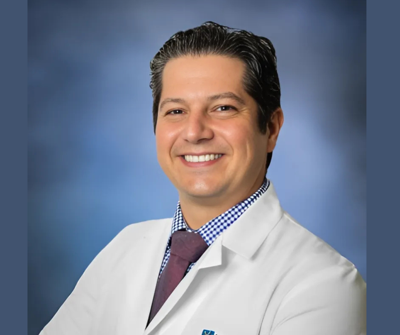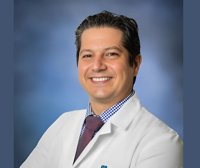
Dr. Shapiro is a practicing community pediatrician who is working as chief health correspondent and medical affairs officer at AltaMed Health Services. Photo courtesy of Dr. Sahpiro.
Despite the fact that the country’s population is 19% Latino, only 6% of U.S. physicians are Latino or Latina. Dr. Ilan Shapiro, from AltaMed, explained to CALÓ News that there are many reasons why there's a Latino physician shortage.
“We have seen decades of problems to actually access the location that our community needs to actually be a doctor and a doctora. This can be complicated with various economic problems of not actually finding a mentor, having problems to actually just stay in this long process between the part of starting and also achieving the goals, because sometimes we have something called the imposter syndrome,” Dr. Shapiro said. “And there are many things around us that complicate that path, so that at the moment we are all together, we need to create the mentors, the space and the opportunities so we can make a huge difference for our community.”
As Dr. Shapiro states, one of the barriers is financial. A new national survey finds that nearly two-thirds of physicians still owe money from medical school and of those doctors, 32% had more than $250,000 in debt remaining, according to Fierce HealthCare.
Even though the Latino community is already harmed by the underrepresentation of Latino physicians, out of the 6%, only 2.4% are actually Latina doctors. Last year, the UCLA Latino Policy and Politics Institute published a report authored in part by Dr. Yohualli B. Anaya, providing the current status of Latina physician representation and its conclusions for health equity. It also highlights the significant disparity between the Latino population and the number of Latino physicians.
Currently, California has a high Latino population, reaching 40%, with further increases projected to 50% by the year 2050. In honor of raising awareness about the crisis and the need for more Latino and Latina doctors, National Latino Physician Day (NLPD) was created and it’s celebrated across the country on October 1.
“The mission is to bring awareness que necesitamos mas. At the moment we are trying to create that space to have enough doctores and doctoras. We need to be all together. We are only 6% of all doctors that are Hispanos and Hispanas in the country for more than 20% of the country that is Hispano and Hispana,” Dr. Shapiro said. “That's why we need to close that gap for the health and future of our communities.”
Dr. Shapiro believes that in order to have enough Latinos serving our communities, it would take about 500 years. “We know that at the moment that we have a doctor or doctora that speaks our language and understands our culture, it brings better services and better outcomes,” Dr Shapiro said. He also added that historically we are having problems with the amount of mentors accessing schools, colleges and universities to get the training that is needed and the resources to actually achieve that amazing and long aspect of education.
When it comes to making decisions about our health and our community, Dr. Shapiro says that the Latino vote is crucial and that there's a clear correlation between our civic health and our representation. “As a physician, I am seeing patients; I can give so much insulin, and I can give so much medication and vaccines. But that's only 20% of our health. The other 80% is the magic of what actually happens when they walk out of our clinics. It's called social drivers of health,” Dr. Shapiro said. “That's the air that we breathe, the schools that we have and the economic impact that we have around our communities. That's why it's so important to make sure that we're represented and voting in order to bring those resources for that 80% to make a huge difference in our health care.”
According to an analysis published by Penn Medicine researchers found that “patient-provider race concordance led to higher odds of receiving the maximum patient experience score.” Which means that patients with similar racial or ethnic backgrounds to their physicians perform better when it comes to their health.
“When we have someone that understands our language and our culture, it makes a huge difference. We have seen it again and again, that the moment that we speak and understand the language and also understand about tecitos, sobadas and other amazing things that we have in our community that create a bridge for health and also equity and awareness,” Dr. Shapiro said.
For him, it’s also important that we encourage the community, specifically the Latino community, to pursue more careers in the medical field. “At the moment that we have a dream, we need to say ‘¡Si Se Puede!’ At the moment that we say ‘¡Si Se Puede!,’ we need to actually have a path of mentors around our community to achieve it. When we have that, we can actually bring resources, scholarships and also that extra energy called ganas for those to actually achieve that, and make sure that they end up getting to their resources and careers that they want to achieve,” he said.
Dr. Shapiro also wanted to share some advice for the current and new generation of Latino physicians. “Any human being that has a dream can achieve it. We need you out there; necesitamos doctores y doctoras to get out there and serve our community,” Dr. Shapiro said. “At the moment we see that there's resources from My Mentor, AltaMed, National Latino Physician Day, the Latino America Student Association and a lot of amazing organizations that are here to help you achieve that dream. It's important to understand that we need more Latino and Latina physicians and we need you to actually make sure that we're represented, bringing those resources that we need to have that new generation of doctores and doctoras serving our community; 6% is not enough.”



(0) comments
Welcome to the discussion.
Log In
Keep it Clean. Please avoid obscene, vulgar, lewd, racist or sexually-oriented language.
PLEASE TURN OFF YOUR CAPS LOCK.
Don't Threaten. Threats of harming another person will not be tolerated.
Be Truthful. Don't knowingly lie about anyone or anything.
Be Nice. No racism, sexism or any sort of -ism that is degrading to another person.
Be Proactive. Use the 'Report' link on each comment to let us know of abusive posts.
Share with Us. We'd love to hear eyewitness accounts, the history behind an article.